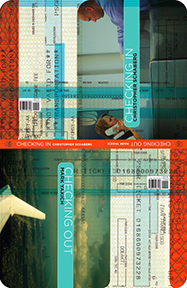What could be more peculiar than flying in an airplane? No matter how many hundreds of times we’ve joined the procession to file into that big metal tube, no matter how used to it we may be, the experience remains utterly unnatural. We may feign nonchalance, seasoned veterans of flight, but if the gods had wanted us to be able to propel ourselves through the air, would we not have been born with a jetpack strapped securely to our back, probably in green or blue? Or, let us suppose that the careless gods merely figured we might find a way, sooner or later, to fill in the blanks. Or some of the blanks, for we are barely a hundred years into this flight thing. There we are, then, seated on a plane smiling at the person next to us, elbows tucked carefully into our sides. We might even tumble into a long and unexpected conversation with them, surprised at our own affability or downright candidness, at the end of which we will still not know their name, despite having been treated to photos of the new grandchild. So much do we take for granted this mode of transport that we no longer bother to remind ourselves that air travel is statistically far safer than by car. Seems counterintuitive, but on the other hand we’d prefer not to know if the facts proved otherwise.
Self-preservation tells us that when standing on a ledge—or way up on a tightrope pausing in the yawning gap between why and why not—we would do best to not look down. That vertigo induced by the recognition of our own folly. So, how come a mere sheet of glass is enough for us to relinquish such advice as we gaze wonderingly upon the clouds beneath us? Do we really think they will catch us if we fall? And how is it that the movie we are watching, from our perch in the airborne drive-in that goes hurtling through space, doesn’t disintegrate before we ever glimpse a single spark? Locomotion, indeed; very loco.
In our suspended animation between one location and the next, that fluid and incessant nowhere which lays claim to us as if we shall never know another place, as if the going were our sole condition and habitation a deluded dream, we cling nonetheless to the thought that there is a place (if not several) where we are really we. The place seems to define us and not all that lies in between there and every destination. Up in the air, within that pressurized cabin, our present existence could not be more elusive. How do we keep up the momentum of faith that we ourselves will arrive not just in one piece but as much one integrated person as when we left wherever that was, whoever we were?
These paradoxes of flight should change us in some way each time we launch forth; even to a small degree, on a molecular level perhaps. Alice was not unaffected when she stepped through the looking glass. In the scientific realm, albeit a more extreme circumstance, it was recently discovered that the astronaut Scott Kelly returned to Earth with his very DNA altered after an extended stay in outer space. Air travel within our planet’s atmosphere, regardless how routine the trajectory, might well yield subtler internal shifts. Nor would first-class passengers be exempt from the pull of otherworldly forces: coddled in their ample cocoons, would they not be the first to grow horns, their bodies expanding with new appendages in spaces that can fit them?
Jason Weiss grew up at the Jersey shore, was schooled in Berkeley, spent a decade in Paris, and has lived in Brooklyn for the past 30 years, working as a writer, editor, and translator. His first book was Writing at Risk: Interviews in Paris with Uncommon Writers (University of Iowa Press, 1991).






